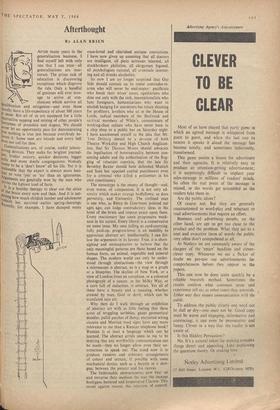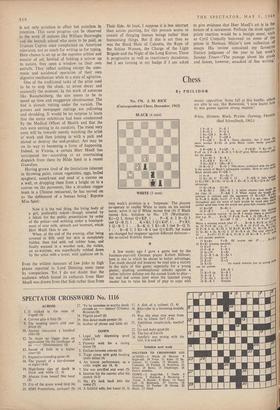Afterthought
By ALAN BRIEN
AFTER many years in the generalisation business, I find myself left with only one that I can trust—all generalisations are inac- curate. The prime task of education is discovering exceptions which disprove the rule. Only a handful of geniuses will ever man- age to arrive at con- elusions which survive all qualification and mitigation—and even those Usually have a life-expectancy of about 300 years 4t most. But all of us are equipped far a little destructive sapping and mining of other people's fortresses of prejudice and dogma. We should ttever let an opportunity pass for demonstrating that nothing is true just because everybody be- lieves it. Some men are islands and every bell does not toll for thee. Generalisations are, of course, useful labour- ving devices. They make for brighter journal- 4m, livelier oratory, quicker decisions, bigger lolls and more docile congregations. Nobody Wants to be a 'don't know' all his life. Yet it•is 111(>liceable that the expert is always more hesi- tantto vote 'yes' or `no' than an ignoramus. Arguments are generally won by the man who carries the lightest load of facts, It is a healthy therapy to clear out the attics c the brain every now and then. And it is sur- ' hlr'sing how much childish lumber and adolescent , has survived earlier spring-cleanings. ecentlY, for example, I have dumped many
once-loved and cherished antique convictions. I have now given up assuming that all doctors are intelligent, all plain actresses talented, all stockbrokers philistine, all clergymen bigoted, all psychologists rational, all criminals interest- ing and all drunks alcoholics.
So now I am no longer surprised that Our Side should contain on its roster comrades-in- arms who will never be soul-mates: pacificists who break their wives' noses, egalitarians who dine out only with the rich, internationalists who hate foreigners, humanitarians who want to abolish hanging for murderers but retain shooting for profiteers, levellers who sit in the House of Lords, radical members of the Beefsteak and satirical members of White's, connoisseurs of working-class culture who have never been in a chip shop or a public bar on Saturday night. I have accustomed myself to the idea that Mr. TOM D-riberg should be a devotee of both Theatre Workship and High Church _Anglican- ism, that Sir Thomas Moore should advocate the legalisation of homosexuality between con- senting adults and the authorisation of the flog- ging of reluctant convicts, that the late Sir Beverley Baxter should have defended Munich and Suez but opposed capital punishment even for a criminal who killed a policeman in his own constituency.
The stereotype is the enemy of-thought—and, even worse, of compassion. It is not only ad- versity which makes strange bedfellows; so does perversity, and University. The civilised man is one who, as R6my de Gourmont pointed out ages ago, can lodge contradictory ideas in the hotel of the brain and impose peace upon them. Every reactionary has some progressive weak- ness in his nature. Every liberal is a conservative on some issue. My own. failing as card-carrying, fully paid-up. progress-lover is an inability to appreciate abstract art. Intellectually, I can fol- low the arguments'in its favour. True, it is short- sighted and unimaginative to believe that the only meaningful patterns are those based on the human form, on animal, vegetable and mineral shapes. The modern world can only be under- stood through• abstractions—the view through a microscope is abstract, so is a map or a graph or a blueprint. The skyline of New York, or a view of London from an aeroplane, or a coloured photograph of a cancer, or the Milky Way, or a cave full of stalactites, is abstract. Yet all of these have a beauty and a meaning, whether created by man, God or devil, which can be translated into art.
Why then do I walk through an exhibition of abstract art with as little feeling that these acres of wriggling scribbles, gaunt geometrical doodles, pallid patches of damp, encrusted wiring circuits and Martian road signs have any more relevance to me than a Russian telephone book? Russian is at least a language which can be learned.- The abstract artists seem to me to be denying that any worthwhile communication can be made—they no longer allow even their un- conscious to speak out. The trend now is to produce random , and arbitrary arrangements of colour and texture, if possible with some mechanical device, such as a bicycle or a shot- gun, between the painter and his canvas. The fashionable abstractionists now beat up and terrorise their medium the way the teenage hooligans battered and bespattered Clacton. This revolt against reason, this rejection of control,
is not only pointless in effect but pointless in intention. This same progress can be observed in the work of authors like William Burroughs and the beatnik school who seem to be paid, as Truman Capote once complained on American television, not so much for writing as for typing. Here chance is set up as the supreme arbiter and creator of art. Instead of holding a mirror up to nature, they open a window on their own entrails. They reflect nothing except the auto- matic and accidental operation of their own digestive mechanism while in a state of agitation.
One of the traditional tasks of the artist used to be to stop the clock, to arrest decay and mummify the moment. In the work of someone like Rauschenberg, the aim seems to be to speed up time and exaggerate obsolescence. The bed is already rotting under the varnish. The posters and newspaper cuttings are yellowing and shredding. It would be no surprise to learn that the entire exhibition had been condemned by the Medical Officer of Health and that the rats were nesting in its outskirts. The trend very soon will be towards merely watching the artist at work and then joining in with a pick and shovel to destroy the end-product. Art may be on its way to becoming a form of happening. Indeed, in Vienna, a certain Herr Muell has anticipated me-according to an entertaining dispatch from there by Hide Spiel in a recent Guardian.
Having grown tired of the limitations inherent in throwing paint, rotten vegetables, eggs, boiled spaghetti, sauerkraut and mud at a canvas on a wall, or dropping them from a height on to a canvas on the pavement, like a drunken rugger team in a Chinese restaurant, he has moved on to 'the defilement of a human being.' Reports Miss Spiel :
Now it is the real thing, the living body of a girl, preferably naked-though covered by a bikini for the public presentation by order of the police-and writhing under a bombard- ment of sour milk, spinach and beetroot, which Herr Muell Likes to use.
When, at the end of the evening, after being covered in filth until her skin is completely hidden, then tied with red rubber hose, and finally encased in a wooden cask, the victim, an ex-waitress, was superficially rubbed down by the artist with a towel, wild applause set in.
Even the wildest rumours of low jinks in high places reported to Lord Denning seem tame by comparison. Yet I do not doubt that the 'audience which found its catharsis from Herr Muell was drawn from Our Side rather than from Their Side. At least, I suppose it is less abstract than action painting, for this process seems to consist of thinging human beings rather than humanising things. But if this is art then so was the Black Hole of Calcutta, the Rape of the Sabine Women, the Charge of the Light Brigade and the Night of the Long Knives. There is progressive as well as reactionary decadence, but I am turning in my badge if I am asked to give evidence that Herr Muell's art is in the nature of a sacrament. Perhaps the most appro- priate reaction would be a benign sneer, such as Cyril Connolly bestowed on some of the pieces in Norman Mailer's new collection of essays. His review contained my favourite literary judgment of the year in last week's Sunday Times-The passage about his stools, and faeces, however, smacked of fine writing.















































 Previous page
Previous page